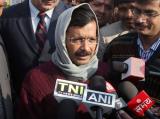New Delhi, Jan 4: Facing criticism, Delhi Chief Minister Arvind Kejriwal today announced his decision not to take up the two five-bedroom duplex flats he has been allotted.
He told the media that he has asked the government to look for smaller accommodation for him.
 "Since yesterday my friends, supporters have been calling me and sending messages saying I should not move into the five-bedroom flat. So, I have decided to forego them. I am asking the government to look for smaller accommodation for me," he said at a party strategy meeting.
"Since yesterday my friends, supporters have been calling me and sending messages saying I should not move into the five-bedroom flat. So, I have decided to forego them. I am asking the government to look for smaller accommodation for me," he said at a party strategy meeting.
He said till then, he would function from his Ghaziabad residence.
Kejriwal has been allotted two five-bedroom duplex flats on Bhagwan Das Road one of which is to be used as his office.
Questioning the Aam Admi party credentials, his opponents including the BJP had attacked him for taking up the flats.
BJP MLAs had yesterday come down hard on Kejriwal in the Delhi Assembly on the issue, saying his decision to accept the two flats was in "total contradiction" of AAP's claim that it will practice austerity.
Asked about the attack on him for choosing a big apartment, Kejriwal said, "It is actually important. We have come to cleanse dirty politics. Like Caesar's wife we have to be above suspicion and we have to subject ourselves to scrutiny".
The Delhi Chief Minister had said yesterday, "I have been given two separate houses, each having five bedrooms. You can take your camera and check the houses. I will be living in one of those with my family while using the other as my office where we can work till late hour".
"Now, I will live with my family in the five-bedroom house. Earlier, I was living in a four-bedroom apartment, that's the only difference," he had said.
He said the party will today discuss the strategy for Lok Sabha elections but ruled out coming out with any names of candidates.
Asked if any big announcement is expected today, Kejriwal said he has already made one today.
Kejriwal has been living in a society flat in Kausambi and had refused to shift to a Type-Seven bungalow which he is entitled to after taking oath as the Chief Minister on December 28.
His team had finalised the two flats on Bhagwan Das Road after scanning a number of government flats near the Delhi Secretariat around Indraprastha Extension.
Delhi government ministers are entitled to Type-Six or Type-Seven bungalows with three-bedrooms. Sheila Dikshit has since 2003 been staying at a Type-8 bungalow on 3, Motilal Nehru Marg in Lutyens Delhi.





Comments
Add new comment